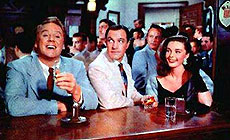|
|
|
|
Brigadoon
|
 |
|
Wishful Thinking In Brigadoon, a line of dialogue pinpoints the problem of wishing for a Utopia. A vivacious woman, belonging to the magical, out-of-time world of Brigadoon, comes on strong to Van Johnson; she projects onto this cynical, beaten up city slicker all her desires for a young, strong, robust man. Johnson reels back and lets fly with the observation: "either that's wishful thinking – or a big lie!" Caught between the luxuriousness and longing of wishful thinking and the brute facts of a big lie; that's the nervous space out of which the discourse of Utopia makes itself heard. It is a discourse not of plans and projects, but of allegories, fictional forms in which problems and anxieties can be broached and thought; allegories of imagination and of the possible. The hope for Utopia is writ large in the happy ending of a musical like Brigadoon – an ending forced beyond any regard for the logic of the fiction – and the melancholy which in a sense forces that ending inscribes itself too: in the unbridgeable gap between the film's 'real' modern metropolis – laceratingly superficial, banal, claustrophobic – and the wistful memory of an ideal which disrupts this scene in its irrepressible bursts and swells of music and singing. Such sad longings animate Utopian fictions – not simply the desire to 'escape' (which always ends badly), but more so the desire to fulfil oneself and others, to realize potentials, to release bottled up energies – that one is led to wonder whether poignancy might not ever be a force, a spring to action, or if it only leads back to lassitude, despair, blockage, a death-drive. In a classic Hollywood Utopian fable like Brigadoon, paradise is something you just find yourself in, if you're lucky enough, if your love and faith is strong enough, if you can prove your allegiance to a certain spiritual code. Fictional Utopias so often seem to become systems that are even more rigid than theories they ostensibly provide an alternative to; certainly the Utopia of Brigadoon is shown to be founded on an exclusion of radical fringe elements (cynics, adventurers, those who are bored with perpetual perfection) and a disturbing sacrificial ritual (sacrifice of the minister who once upon a time pleaded with God that Brigadoon be removed from time so as to keep out the "dangers from the outside world"; sacrifice of anyone who wishes to leave, for if they do the spell is broken). At the very end of the film, Gene Kelly (who believes that his love can bring back Brigadoon) and Van Johnson (who has described Brigadoon as his "prison") arrive at the magic moment in time and space where the happy ending materializes; and while the camera follows Kelly into the arms of his retrieved beloved, into the centre of Brigadoon, it can only – without acknowledging it – leave Johnson at the border, lost and disavowed. This is a desperate Utopian solution, achieved and materialized at the expense of no matter what. MORE Minnelli: The Band Wagon, Madame Bovary, The Pirate, Some Came Running, On a Clear Day You Can See Forever, Meet Me in St Louis book review Minnelli: Directed by Vincente Minnelli © Adrian Martin June 1985 |
![]()